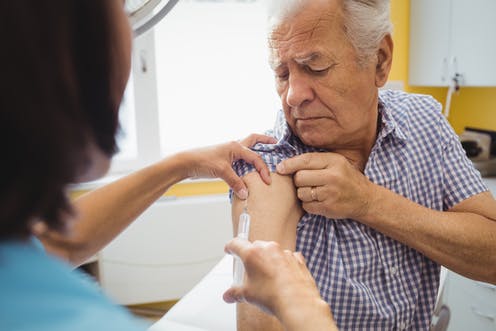


AN OLD MAN IS LIKE A CHILD : WHY WE MUST VACCINATE THE ELDERLY.
The increase in elderly population is a worldwide phenomenon. It is due to increased life expectancy and decreased mortality resulting from improvement in healthcare: the advent of antibiotics, vaccines, newer treatments, diagnostics and improved standards of living. The increase in elderly population is more in developing countries than industrialized nations.
Older adults need immunization for several reasons:
1. They may not have received the vaccines in their childhood
2. New vaccines for adults have become available
3. Immunity acquired in childhood can fade with age
4. Older adults or those who are chronically ill are more susceptible to vaccine-preventable diseases and complications
5. With age, the immune system becomes weaker - a phenomenon called immuno-senescence
6. Both herd immunity and cocoon immunity are enhanced by vaccinations leading to lessening or even eradication of infectious diseases
Multiple Vaccinations are available for The ageing population :
1. Pneumococcal vaccine
Pneumococcal vaccine is available in two forms:
2. Influenza vaccine
3. Meningococcal vaccine
The quadrivalent vaccines contain 50 μg of each of the antigens A, C, Y, and W135 whereas the bivalent vaccine has only A and C antigens.
Two types of quadrivalent vaccines are available:
The meningococcal polysaccharide vaccine (MPSV4) does not induce herd immunity, has no effect on nasopharyngeal carriage, and can be used only in those >2 years age. MPSV4 is preferred for adults aged 56 years or older who have not received MCV4 previously and who require a single dose only eg. Travelers .
The meningococcal conjugate vaccine (MCV4) provides herd immunity, reduces nasopharyngeal carriage, provides long-lasting immunity after 28 days of vaccination, but cannot be used for people >55 years. MCV4 (conjugated) is preferred for adults who are aged 55 years or younger as well as for adults aged 56 years or older who (a) are vaccinated previously with MCV4 and are recommended for revaccination, or (b) for whom multiple doses are anticipated.
4. Tetanus, diphtheria, and pertussis vaccine
All elderly adults (older than or equal to 65 years) should have completed a primary series of diphtheria and tetanus toxoids and thereafter should receive a booster dose every 10 years. dT should be used to provide protection against both diseases. Persons with unknown or uncertain histories of receiving diphtheria or tetanus toxoids should be considered unvaccinated and should receive a full three-dose primary series of dT .
5. Varicella Zoster vaccine
Two vaccines, both containing an attenuated live VZV are currently available in India. All adults who have never had chickenpox should receive 2 doses 0.5 ml in deltoid area subcutaneously 6 months apart .
6. Hepatitis A Vaccine
Vaccines against hepatitis A virus (HAV) include inactivated vaccines as single antigen (HAV antigen) vaccines or combined with HBV antigens. Hepatitis A vaccine is indicated for all transplant candidates with CLD or those patients of end-stage renal disease (ESRD) who have chronic hepatitis B or C because of increased risk of fulminant hepatic failure.
7. Typhoid vaccine
The available vaccines for typhoid fever include inactivated whole cell vaccine, live oral Ty21a vaccine, injectable Vi polysaccharide vaccine, and Vi-rEPA vaccine.
Three doses of Ty21a capsules/sachets are administered on alternate days. This series should be repeated once in every 3 years as a booster dose. The capsule formulation should be taken orally with safe water.
The Vi vaccine is given as a single subcutaneous or intramuscular dose of 0.5 ml, with revaccination every 3 years.
Conclusion
The aged people not only suffer from frequent episodes of illness but the disease severity is also higher due to the age-related decline in immunity. The diseases result in a lot of expenditure and consequently decreased quality of life among elderly. It is estimated that vaccines can prevent more than half of deaths due to pneumonia and influenza.
If the immunization for elderly is included in the National Immunization Program, it will benefit the elderly population and decrease complications, chronic long term care and its associated cost.